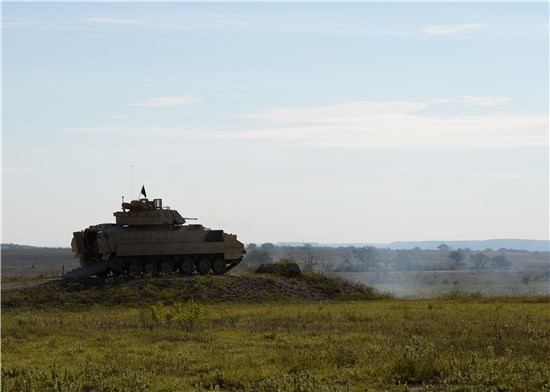 |
| Soldiers from the Texas Army National Guard’s Regional Training Institute (RTI) fire a 25mm round from a Bradley fighting vehicle at Fort Hood, Texas, Sept. 25, 2014. Six soldiers completed the range for the final event of their transition to 19D cavalry scout military occupation specialty (MOS), one of several MOS certifying schools Texas’ RTI runs. (U.S. Army National Guard photo by Capt. Martha Nigrelle/ Released) |
Story and photo by: Capt. Martha Nigrelle
Fort Hood, Texas (Oct 1, 2014) - Many soldiers say going to the range is fun and a good chance to refine marksmanship skills. For soldiers from the Texas Army National Guard’s Regional Training Institute, the Bradley live-fire range was also an opportunity to shoot a 25mm chain gun from the Bradley, a lightly armored, tracked military vehicle and was the final event standing between them and a new military occupational specialty.
Six soldiers, five from Texas and one from the Illinois Army National Guard, spent three weeks training with the Texas RTI, and just two days after completing the Bradley live-fire range, earned the title of 19D or cavalry scout in a graduation ceremony held at Camp Mabry, in Austin on Sept. 28, 2014.
During the Bradley range iteration, several Texas Military Forces’ leaders came out to visit the soldiers and observe the training.
There are approximately 1,000 cavalry scouts in the Texas Army National Guard, said Maj. Gen. William Smith, Deputy Adjutant General – Army and Commander of the Texas Army National Guard. Training soldiers for this job in Texas is financially beneficial.
“It’s a huge advantage,” said Smith. “If we bring them to Camp Mabry or Camp Swift, we have quarters and rations and it’s much cheaper. The other advantage is we don’t waste a lot of time sending them somewhere else.”
Maj. Gen. Kenneth Wisian, Deputy Adjutant General – Air and Commander of the Texas Air National Guard, also visited soldiers on the range. Wisian talked about the importance of understanding the capabilities of other components, outside the Air Force when working in a joint environment. For him, the visit wasn’t just an opportunity to see the troops, but also a chance to conduct joint training, by observing one of the Army’s capabilities up close.
“This is the basic level joint training that they always try to teach you in school,” said Wisian. “There is nothing better than hands on training with the other components.”
The Texas RTI is a U.S. Army Training and Doctrine Command certified school and is open to any member of the active, National Guard or reserve element of the U.S. Army. RTI can train and certify soldiers in infantry, cavalry, field artillery, combat medic and a few signal specialties. Instructors are all members of the Texas Army National Guard and spend approximately three to five years training soldiers that come to RTI said Staff Sgt. Michael Dixon, an RTI instructor.
“The instruction is even better because it is more one-on-one,” said Command Sgt. Maj. Mark Weedon, RTI Command Sergeant Major, Texas Army National Guard. “We have really worked hard to get our instructors trained for these courses as opposed to bringing people in on a temporary basis.”
The Texas RTI primarily trains transition and noncommissioned officer professional development courses for each level of NCO.
“I just love doing this,” said Dixon. “Training soldiers and making our force better for tomorrow.”